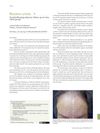 8 citations,
September 2021 in “Journal of Cosmetic Dermatology”
8 citations,
September 2021 in “Journal of Cosmetic Dermatology” Some diets and supplements might help with skin disorders, but their effectiveness varies and more research is needed.
 1 citations,
February 2017 in “MOJ bioequivalence & bioavailability”
1 citations,
February 2017 in “MOJ bioequivalence & bioavailability” Treating hair loss effectively may require a multi-sided approach, using different treatments together, and topical treatments could be more effective and safer than oral ones.
 26 citations,
October 2018 in “Clinical & Translational Oncology”
26 citations,
October 2018 in “Clinical & Translational Oncology” Spanish experts provided guidelines for treating skin side effects in cancer patients on new therapies, stressing early action and teamwork.
 5 citations,
January 2017 in “Clinics in Dermatology”
5 citations,
January 2017 in “Clinics in Dermatology” Skin symptoms without a medical cause often reflect psychological stress and are influenced by culture, requiring a team approach for treatment.
 4 citations,
September 2014 in “Elsevier eBooks”
4 citations,
September 2014 in “Elsevier eBooks” Use some skin medications with caution during pregnancy; avoid strong steroids, certain eczema treatments, and systemic retinoids, but many topical treatments and nasal sprays are safe.
 June 2022 in “Indian Dermatology Online Journal”
June 2022 in “Indian Dermatology Online Journal” Teledermatology effectively managed most skin conditions remotely during the COVID-19 pandemic.
 February 2021 in “Journal of nursing education and practice”
February 2021 in “Journal of nursing education and practice” Women and men experience different quality of life and symptom distress after kidney transplant with immunosuppressive therapy.
10 citations,
September 2022 in “Animals” Certain genes affect udder shape in Holstein cows, important for health and milk production.
 December 2023 in “Aesthetic Cosmetology and Medicine”
December 2023 in “Aesthetic Cosmetology and Medicine” COVID-19 can cause hair loss, but specialists can help treat it.
36 citations,
January 2016 in “The journal of investigative dermatology/Journal of investigative dermatology” The document concludes that understanding genetic mutations in the PI3K-AKT-mTOR pathway can lead to better diagnosis and treatment for certain genetic skin disorders.
 7 citations,
October 2019 in “Klinická onkologie”
7 citations,
October 2019 in “Klinická onkologie” Cancer treatments often cause hair loss and damage, affecting patients' mental health.
 4 citations,
February 2016 in “Clinical Pharmacology & Therapeutics”
4 citations,
February 2016 in “Clinical Pharmacology & Therapeutics” Hair follicle samples effectively show how well the drug MK-0752 targets and engages with the Notch pathway.
 October 2022 in “Aesthetic Cosmetology and Medicine”
October 2022 in “Aesthetic Cosmetology and Medicine” PCOS often causes skin problems due to hormonal and metabolic imbalances.
 1 citations,
April 2021 in “Aesthetic Cosmetology and Medicine”
1 citations,
April 2021 in “Aesthetic Cosmetology and Medicine” Microneedling improves skin conditions and self-esteem when tailored to individual needs and combined with other treatments.
 1 citations,
March 2018 in “Dermatologie pro praxi”
1 citations,
March 2018 in “Dermatologie pro praxi” Most over-the-counter hair loss treatments lack strong evidence of effectiveness, except for minoxidil, which works but stops working if you stop using it.
 December 2024 in “Zanco Journal of Medical Sciences”
December 2024 in “Zanco Journal of Medical Sciences” Finasteride and dutasteride are equally effective and safe for treating BPH.

Female pattern hair loss, common in women, can be treated with various methods like minoxidil, anti-androgen treatments, and light therapy, but early intervention and realistic expectations are crucial.

Nanoformulations improve luteolin's effectiveness as a cancer treatment.
 25 citations,
December 2017 in “Facial Plastic Surgery”
25 citations,
December 2017 in “Facial Plastic Surgery” Combination therapy with steroids and pimecrolimus improved or stabilized hair loss in most patients with Frontal Fibrosing Alopecia, who also had a high rate of hypothyroidism.
102 citations,
April 2014 in “PloS one” Wharton’s Jelly stem cells from the umbilical cord improve skin healing and hair growth without scarring.
 17 citations,
October 2017 in “Journal of Cutaneous Medicine and Surgery”
17 citations,
October 2017 in “Journal of Cutaneous Medicine and Surgery” No treatment has been proven to effectively stop hair loss or regrow hair in Frontal Fibrosing Alopecia, and more research is needed.
 13 citations,
October 2012 in “InTech eBooks”
13 citations,
October 2012 in “InTech eBooks” Nanocarriers could improve how drugs are delivered through the skin but require more research to overcome challenges and ensure safety.
 May 2019 in “Anais brasileiros de dermatologia/Anais Brasileiros de Dermatologia”
May 2019 in “Anais brasileiros de dermatologia/Anais Brasileiros de Dermatologia” Frontal fibrosing alopecia mostly affects postmenopausal women, with diagnosis often delayed by 3 years.
 3 citations,
August 2011 in “Current Psychiatry Reviews”
3 citations,
August 2011 in “Current Psychiatry Reviews” Family-based treatment is the best outpatient care for stable teens with anorexia, and more research is needed on medication and treatment effectiveness for young people with eating disorders.
 18 citations,
January 2020 in “Journal of Clinical Research in Pediatric Endocrinology”
18 citations,
January 2020 in “Journal of Clinical Research in Pediatric Endocrinology” The document concludes that Functional Hypothalamic Amenorrhea should be carefully diagnosed and managed to prevent health complications, using lifestyle changes and specific medications.
 1 citations,
March 2023 in “European Journal of Human Genetics”
1 citations,
March 2023 in “European Journal of Human Genetics” The UK's EDS National Diagnostic Service found that early diagnosis, lifestyle advice, and regular check-ups are crucial for managing vascular Ehlers-Danlos syndrome. A combination of losartan and bisoprolol can reduce vascular events, improving survival and quality of life.
 September 2020 in “bioRxiv (Cold Spring Harbor Laboratory)”
September 2020 in “bioRxiv (Cold Spring Harbor Laboratory)” Different fish use the same genes to regrow teeth.
 1 citations,
December 2022 in “Archives of Dermatological Research”
1 citations,
December 2022 in “Archives of Dermatological Research” Acne treatment with isotretinoin increases the presence of p53, a protein, in skin and oil glands, which may help reduce acne severity.
 451 citations,
March 2005 in “Endocrine Reviews”
451 citations,
March 2005 in “Endocrine Reviews” The enzyme steroid sulfatase is linked to breast cancer and other conditions, and inhibitors are being developed for treatment.
 25 citations,
March 2017 in “Archives of Dermatological Research”
25 citations,
March 2017 in “Archives of Dermatological Research” Sinapic acid may help hair growth by activating a specific cell pathway.



























